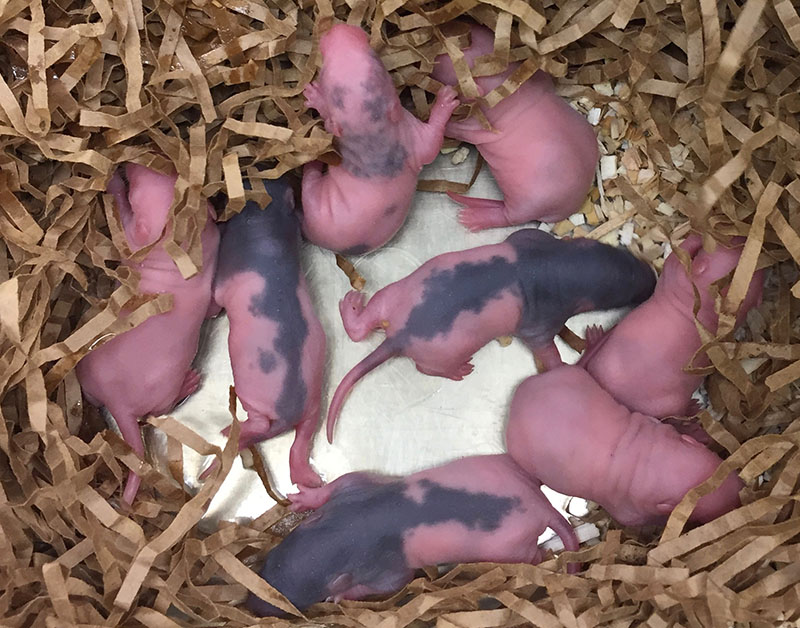 The Tulane Transgenic Core Facility strives to provide the latest techniques for the creation of genetically modified mice and rats for research. The CRISPR/Cas9 system has been adapted from its native use in bacteria to be used in other organisms to modify DNA. The CRISPR/Cas9 system consists of crRNA, tracrRNA, and Cas9 protein. The crRNA, tracrRNA and Cas9 protein combine to form a protein-RNA complex that can cut DNA. The crRNA is designed to anneal 20 bases upstream from a PAM site (NGG) and the Cas9 cuts three bases upstream from the PAM site.
The Tulane Transgenic Core Facility strives to provide the latest techniques for the creation of genetically modified mice and rats for research. The CRISPR/Cas9 system has been adapted from its native use in bacteria to be used in other organisms to modify DNA. The CRISPR/Cas9 system consists of crRNA, tracrRNA, and Cas9 protein. The crRNA, tracrRNA and Cas9 protein combine to form a protein-RNA complex that can cut DNA. The crRNA is designed to anneal 20 bases upstream from a PAM site (NGG) and the Cas9 cuts three bases upstream from the PAM site.
Once the DNA strand has been cut, DNA repair mechanisms go to work repairing the cut. During non-homologous end-joining repair (NHEJ), errors resulting in short deletions can occur, creating a gene knockout. When single stranded DNA that is homologous to the sequence at the cut site is present, homology directed repair (HDR) can use the donor DNA as a template to alter the sequence at the cut site. HDR can be used to make precise, single base changes and to insert tag sequences into genes. HDR can also be used to insert large DNA fragments and to create conditional knockout lines.
The Tulane Transgenic Core Facility is now offering CRISPR/Cas9 services in both rat and mouse. The facility uses IDT’s Alt-R™ system, which utilizes synthetic crRNA and tracrRNA and S.p. Cas9 nuclease. The core facility provides the Cas9 protein and tracrRNA. You provide the crRNA purchased from IDT and purified donor DNA.
We recommend that you test your crRNA in cell culture and develop a robust genotyping strategy before you start creating your CRISPR modified mouse or rat line. For a fee, the Core can test your crRNA, with or without ssODS, in zygotes. We suggest that you design your donor DNA to modify the PAM site to prevent repeated cuts at the target site. You can also design your donor DNA to include a silent mutation that creates or eliminates a restriction site to aid in genotyping.
Please contact Ann Mullin if you are interested in CRISPR/Cas9 services.
Investigators must supply the following items:
- Alt-R™ CRISPR crRNA from IDT, 2nmol
- Ultramer® DNA oligos from IDT
- ds DNA donors can be a plasmid or purified DNA fragment
- Current protocol number
- IT or PO for payment
- Service request form
General Timeline:
- crRNA and donor DNA delivered (mice are ordered after delivery)
- Eggs injected for 2 sessions (investigator notified)
- Foster mice give birth (investigator notified)
- Tail tips given to investigator at 15-16 days
- Genotyping results are expected within 3 days of delivery of tail tips
- Pups are weaned at 21 days and transgenic pups are released to the investigator
The time from notification of beginning injections sessions to delivery of tail tips normally takes 5-8 weeks, with 2 sets of tails expected.
Special notes
The facility routinely uses the inbred mouse strain C57BL/6J as the background strain. Investigators who need to use a different strain will need to cover the cost of the male mice and any additional cost for the female mice required for the procedure and pay the per diem charges for these mice.
If the foster females fail to deliver live pups, the process will be repeated at no additional cost (other than the cost of more female egg donors, if needed). The investigator must inform the facility if the mutation may cause any severe defects or lethality, so that pups can be properly monitored.
Off-target mutations in zygotes is less common than in cell culture, but it is still recommended that off-target sites are examined for mutation. When using donor DNA, it is important to analyze founder animals for random insertion of the donor DNA into the genome. These tests are to be performed by the investigator using a method of their choice.
Mosaic animals are common, and you must carefully analyze the genotype of your founders’ progeny.
If the investigator has not contacted the facility with the results of the genotype by weaning, all the pups will be transferred to the investigator's protocol number and account.
Please contact Ann Mullin for current pricing information. Outside investigators must be at an institution based in Louisiana.
